“That Fan did not see any of this is not so ironic, for all along her journey we’ve observed more of her than she’ll ever know. She moves on, she pushes forward, this her guileless calling, and we have to remind ourselves that it’s perhaps more laudable simply to keep heading out into the world than always tilting to leave one’s mark on it.” — Chang-rae Lee, On Such a Full Sea
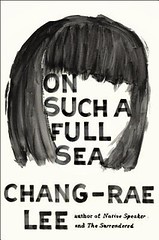 On Such a Full Sea
On Such a Full Sea
Chang-rae Lee
![]()
In the same way Paolo Bacigalupi’s and Margaret Atwood’s near-future dystopias, founded on present realities and trends, seem likely to become our lot, Chang-rae Lee’s near-future dystopia has the feel of probability, if not inevitability. We can picture our grandchildren living in Fan’s world.
Fan, the heroine of On Such a Full Sea, is a member of a service caste, one of a numerous clan of refugee immigrants from New China. Her caste lives in the once devastated, but now partially rebuilt, industrial cities of the former USA, where they manufacture goods and grow food for the charters, corporate city-state enclaves where the upper castes live. Fan was born into her caste, and B-More, the former Baltimore, is the only home she knows … until, that is, she strikes out on her own, an almost unprecedented thing for a member of the service caste to do.
Citizens of the charters can fail, and when they fail they are evicted to the counties, the lawless wilderness that composes most of what is left of the former first world. Once there they must sink or swim on their own. The counties are ruled by warlords and local thugs, and there are no social services. The people who live in the counties generally die there; they cannot become charter citizens, nor can they break into the service caste, where at least housing, some medical services, and a guaranteed income make life tolerable for those who produce food and goods. A very small number of service caste children are able to test into charter citizenship, but overall social mobility trends down, not up.
The narrator is an unnamed member of Fan’s clan in B-More, an unbounded optimist and civic booster, full of praise for the simple and well-regulated lives of workers, the many services provided by the Directorate, and the pleasures of life in B-More’s crowded row houses. By about page 2 the reader begins to see through the gaps in the narrator’s story. Things are not well in B-More … or anywhere else for that matter.
Fan cleans giant tanks in B-More’s fish farms. Her boyfriend Reg, an agricultural worker, is “disappeared” one day. She leaves B-More for the lawless counties, ostensibly in search of Reg, armed with nothing more than her own determination. Fan’s adventures, all of which are related second-hand by the unnamed narrator, fairly leave the reader gasping. Somehow Fan manages to survive, narrowly escaping disaster after disaster, each disaster offering a deeper look into a dysfunctional world slowly grinding to a halt.
I’m buggered if I can figure out who the narrator of this tale is, unless it’s Fan herself, writing her own story in the person of a once-removed observer. But that’s part of the fun of reading Chang-rae Lee’s novel, wondering how much the narrator actually knows and how he or she knows it.
Chang-rae Lee stacks up well against the likes of Paolo Bacigalupi and Margaret Atwood, This is a fascinating story, and it’s telling a kind of truth, as only fiction can. On Such a Full Sea is an excellent, engaging, and thought-provoking read.
 The Martian
The Martian
Andy Weir
![]()
Reading the reviews, I saw that some readers didn’t finish reading The Martian. I confess I considered giving up too, but that was before I got to the good parts.
The story begins with Mark Watney stranded on Mars after his five crewmates leave in an emergency mission abort. He’s hit by a flying object as the crew makes a surface dash from the HAB to the MAV during a fierce Martian windstorm, and assumed dead. But of course he’s not, and thus begins his diary of survival on Mars, alone and with no hope of rescue for approximately four years.
Now that’s a gripping premise, but the first hundred pages or so are a bit of a slog, particularly for readers with no technical background, because they read like an engineering geek’s wet dream. This, I suspect, is the stage where some readers performed an emergency mission abort of their own, but I stayed on the Martian surface with Mark and suddenly Andy Weir shifted the POV from Mars to Earth, where a mission imagery specialist, looking at hi-res satellite images of the abandoned Mars landing site, begins to realize someone might still be alive down there.
From this point on the POV shifts back and forth between Mars and mission control, even expanding to include the five astronauts in their ship returning to Earth, and I found the book not only easier going, but tremendously exciting.
There’s a lot of engineering, astrophysics, and Mars trivia packed into these pages, but once you realize the stranded astronaut has a plausible chance of survival, you forget you’re wading and start to feel as if you’re running.
After that rough start, I was enthralled. I want all my friends to read this book, along with Mary Roach’s Packing for Mars. I think a lot of people are going to be talking about The Martian this year. It’s awesome.
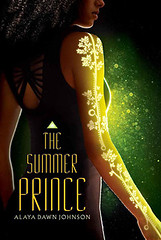 The Summer Prince
The Summer Prince
Alaya Dawn Johnson
![]()
Reviews indicate readers love The Summer Prince … except when they hate it. Brazilian reviewers mostly hate it. With apologies to the Brazilian friends I hope to have some day … alas, I haven’t even met any to date … I loved it. Not enough to give it four stars, but three-and-a-half is a lot of love from me.
The world-building in The Summer Prince is new and refreshing, especially to regular readers of YA dystopias. This one’s set in South America, in the nation that was once Brazil, hundreds of years after a global nuclear war. The new world will not be recognizable to North Americans, because our old stomping grounds are so heavily irradiated now no one lives there. The action in this novel takes place in a futuristic city-state called Palmares Três. After the nuclear war, nature itself apparently rejected men (there are several references to a post-war plague that decimated the male population), so society apparently followed, and Palmares Três is matriarchal. Although men have bounced back and represent about half the population, they rarely aspire to politics … with the exception of the winter and summer kings, who are elected by the general population every five years. The kings are executed after a year in office, but before they die they either choose a new queen or reaffirm the existing one. Everyone else, including the queens, lives out his or her natural lifespan, which has been so enhanced through technology and body modifications that people now live almost 200 years.
This part of Johnson’s world-building was a bit confusing to me. I never fully understood the difference between winter and summer kings. Is it just the summer king who chooses the next queen and is then executed, or both? It wasn’t clear to me, and I noted other reviewers asking the same question. I also didn’t understand the novel’s title, since there are no princes in the story, only kings. But the general idea is clear enough, and as I mentioned refreshingly different.
The central characters in this novel are June, a young artist; her boyfriend Gil, a student; and Enki, the newest summer king, a rebellious young man from the lower classes of Palmares Três. Both June and Gil love Enki; Enki loves everyone.
The three-way love affair between June, Gil, and Enki is fraught with tension, but what really kept me going was June and Enki’s plot to change Palmares Três and its ruling dynasty. Believe me, if you’re a hard-core science fiction fan, there’s plenty here to fascinate you. If you’re addicted to YA romance, there’s lots of that too. If you’re a political science wonk, The Summer Prince will give you much to think about.
The more I reflect on The Summer Prince, the more I appreciate what Alaya Dawn Johnson has attempted to do. This is an ambitious novel on several levels.
Book banners love to scrutinize YA novels, and should The Summer Prince become popular and start showing up on middle school reading lists, I expect them to weigh in. Gll and Enki enjoy a protracted homosexual relationship. June isn’t promiscuous, but sex is frankly an important part of her life (as it is for all the teenaged inhabitants of Palmares Três, it seems), and she too falls into a sexual relationship with Enki. No one in Palmares Três cares whether lovers are homosexual or heterosexual; in fact June’s mother is in a same-sex marriage. And that’s not all: Christianity is a dead religion in Palmares Três, referred to only in ancient songs and books. Oh, yeah, we’ll definitely be hearing from the book banners.
If you’re an adult reader, you can easily ignore the novel’s YA label and read it as adult SF with young protagonists. I think you’ll have a good time with it. I did.
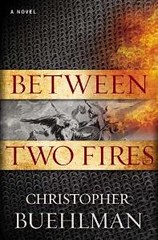 Between Two Fires
Between Two Fires
Christopher Buehlman
![]()
I can’t remember how I heard of this book, but something gave me the idea it was worth reading so I downloaded a copy to my Kindle.
I was engaged at first by what appeared to be an adventure/mystery set in France during the plague of the mid-14th century. I was initially amused by the superstition that passed for knowledge during medieval times, superstitions that form the beliefs and actions of the story’s protagonists, a down-at-heels brigand knight, an odd little girl (whom I at first thought to be Jeanne d’Arc as a child), and a drunken priest. The three set out for Avignon, home of the Pope, a quest led by the little girl. Promising stuff … a road novel of the Plague Years.
But the promise is a false one. The novel isn’t about superstition, it is superstition, the nasty brutish medieval kind where Satan and his demon minions live on earth, doing battle with angels from on high but mostly masquerading as men in order to trap mortals and consign them to hell, but not before using their dead, corrupt, pus-oozing bodies in horrible ways. Once the demons appear, the story degenerates into a mere catalog of nastiness: devilish monster after devilish monster doing one nasty thing after another, fooling the knight and the priest every time, but not the little girl, who is an angel in training (and disappointingly not the future Jeanne d’Arc).
And that’s the novel: primitive twaddle about devils and angels, the kind of stuff priests used to terrify illiterate peasants with, no point to any of it, devils fooling people over and over again. I know some horror fans don’t care where their horror comes from, whether it’s supernatural or not. I frankly don’t have any use for the supernatural, because it just doesn’t happen in this life, okay? And in this case, Buehlman’s attempts to increase the level of horror as the story advanced reminded me of nothing so much as a Transformers movie: the scary things became larger and more numerous, but they were still the same things they were all along … Mr. Buehlman is solidly in the More Is Better camp.
Why two stars and not one? Because Mr. Buehlman took care to edit and proofread his work before publishing it: I want authors and publishers to know that some of us care about that sort of thing and appreciate it.
Books I Didn’t Finish Reading
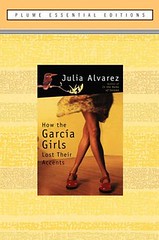 How the García Girls Lost Their Accents
How the García Girls Lost Their Accents
Julia Álvarez
![]()
I read (part of) this one for my book club. The category was “ethnic fiction.” Everyone in the group (me included) had the same question: what’s ethnic about it? What did we learn about being a member of a wealthy Dominican family with homes in Dominica and the USA? To be fair, the book does not claim to explore ethnicity, so we really should have read it as a mainstream, or possibly young adult, novel.
My impression is that Julia Álvarez first wrote it as a series of short stories, then connected them to make a novel. There’s really not much here to justify a novel, though. It starts out interestingly enough but then levels off and goes nowhere. There are no interesting developments in the plot, and after we learn about the various neuroses the daughters are afflicted with, we learn little more. Several book club members remarked that they had a hard time telling the daughters apart.
There were opportunities to write about social stratification and even rebellion in Dominica, but sadly Ms Álvarez took a pass on all that.
One last note: I read the Kindle edition, and it is full of typos and needlessly hyphenated words … clearly no one edited it after converting it to ebook format.
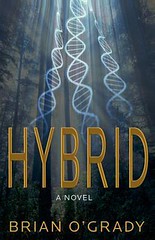 Hybrid
Hybrid
Brian O’Grady
![]()
Hybrid started out well, despite some irritating editing mistakes, but quickly turned to shit. Any time some plot element needs to be resolved, Mr. O’Grady gives a character previously-undisclosed superpowers. The instances that irritated me the most were the villain’s (surprise!) ability to deflect bullets with his mind, followed by the coroner’s mousy nurse suddenly turning into a KGB colonel with Spetznaz skills. At that point I decided to move on. Hybrid might as well be a superhero comic book. While I might be persuaded to read a literary graphic novel (though not where anyone might see me), I’m not going to waste my time on superhero comic books.